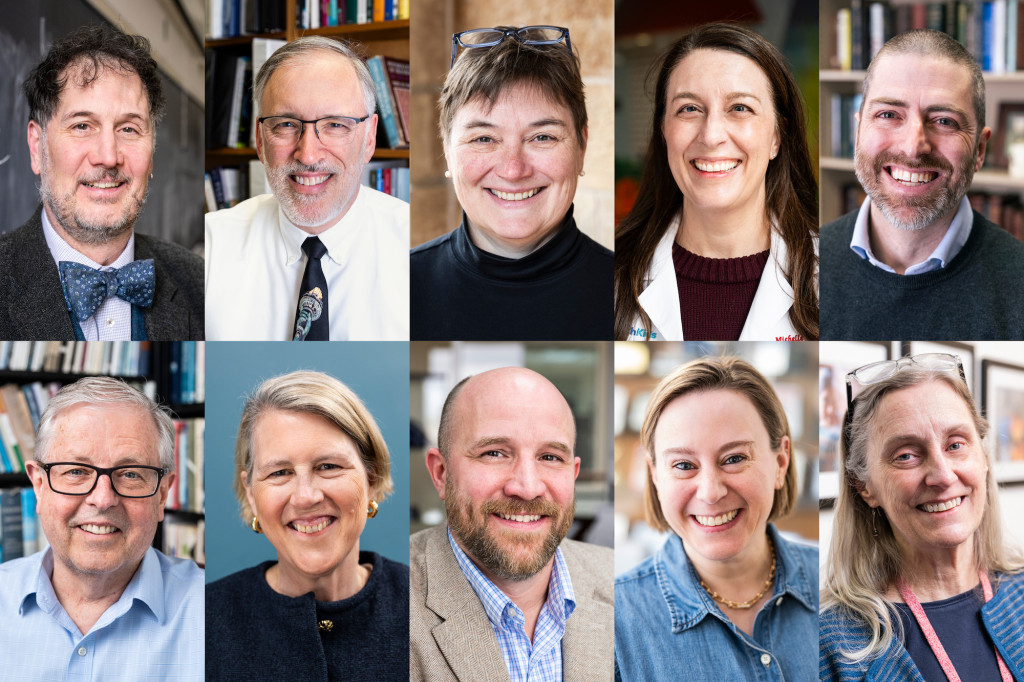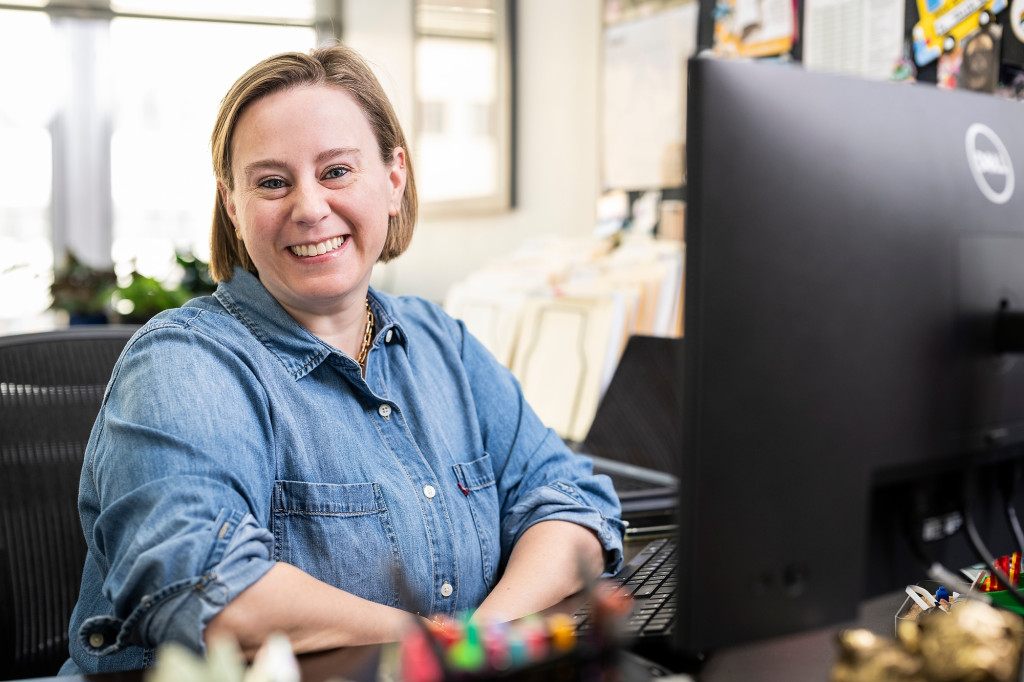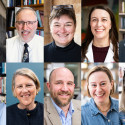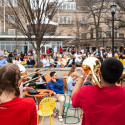Meet the 2025 Academic Staff Excellence Award winners

The winners of the 2025 Academic Staff Awards.
Each year, the University of Wisconsin–Madison recognizes outstanding academic staff members who have excelled in leadership, public service, research and teaching.
“As the largest employee group on campus, our academic staff members are critical to all that we do,” says Chancellor Jennifer L. Mnookin. “They are gifted teachers, world-class researchers, impactful mentors, and innovative administrators. We rely on them to bring the Wisconsin Idea to life — in the classroom and throughout the state and the world.”
The following 10 employees are recipients of 2025 Academic Staff Excellence Awards.
Chancellor’s Hilldale Award for Excellence in Teaching
Scott Mellor
Teaching Professor, Department of German, Nordic and Slavic+

Scott Mellor teaches a Folklore 345: Nordic Storyteller class in Van Hise Hall. Photo: Jeff Miller
Scott Mellor’s student reviews would be the envy of any instructor: “Extremely enlightening, funny, charismatic, caring,” reads a typical one.
Mellor’s high marks reflect in part his ability to help design engaging and unique courses, a skill he’s honed during a quarter century on campus. He uses approachable topics as vehicles for helping students think critically and tackle deeper questions of society and justice — topics like Horror Films as Expressions of National Angst (Folklore 225) and Myths and Mechanics: Crafting Games with Nordic Folklore (Folklore 530). Mellor’s creativity is credited as one of the reasons his department’s folklore certificate is so popular and has seen consistent growth.
Mellor has been a cornerstone of the department’s team-taught Contemporary Scandinavian Languages course, which equips advanced students with competence in Danish, Norwegian and Swedish, and he has been exemplary in embracing high-impact learning opportunities. He heads the Nordic languages floor for the International Learning Community, contributes as a faculty fellow in the Bradley Learning Community, and has taught a longstanding and popular First-Year Interest Group course called World of the Sagas.
“Dr. Mellor is an indefatigable, energetic, dedicated, and innovative educator, someone who consistently pulls more than his weight in our busy and varied department.”
– Associate Professor Claus Elholm Andersen, Department of German, Nordic and Slavic+
Mary Lucy Clark Distinguished Teaching Award
Jeff Henriques
Teaching Faculty III, Department of Psychology

Jeff Henriques teaches a Psych 201: Basic Statistics for Psychology Majors class in the Brogden Psychology Building. Photo: Jeff Miller
After completing his PhD in 1998, Jeff Henriques began teaching in the Psychology Department and has been a mainstay ever since. In addition to courses in his specialty area of clinical psychology, he regularly teaches two foundational classes: Introduction to Psychology (75 times) and Basic Statistics for Psychology (43 times). More than 25,000 students have passed through his classes.
In his teaching, Henriques seeks continuous improvement and innovation, tracking learning and engagement to ensure that any changes made are data-driven and focused on student outcomes.
His impact on students is profound. He’s often the first to encourage them to join a research lab, apply for an internship or consider graduate school. Students praise his accessibility and his ability to make difficult content relevant and fun.
As a trusted advisor and engaged mentor, Henriques has changed many career trajectories. As a valued colleague, he has been an integral part of the UW–Madison Teaching Academy, sharing his expertise in a variety of leadership roles over the years.
“I could not imagine anyone else who could provide a more effective introduction to the world of academic research and statistical analysis than Dr. Henriques.”
– Senior Zoe Regenstein, psychology and legal studies major
Chancellor’s Award for Excellence in Service to the University
Lindsey Stoddard Cameron
Faculty Services, Office of the Secretary of the Faculty

Lindsey Stoddard Cameron is pictured next to the Sifting and Winnowing plaque in the portico of Bascom Hall. Photo: Jeff Miller
For nearly 30 years, Lindsey Stoddard Cameron has been an indispensable pillar in the Office of the Secretary of the Faculty, where she is known across campus for her ingenuity and thoughtfulness and for going far beyond what is required of any task.
A core part of her role supports early-career faculty. She has helped design and grow many key programs, including the New Faculty Welcome, tenure workshops, and the Women, Trans and Non-Binary Faculty Mentoring Program. Leveraging years of campus relationships, Stoddard Cameron has deftly helped match more than 500 assistant professors with tenured mentors.
Equally impressive has been her decades of service to a vital institutional bedrock: shared governance. During two terms on the Academic Staff Executive Committee and in many other capacities, she has advocated passionately on behalf of campus community members in areas including equity and diversity, compensation and benefits, parental leave, and leadership opportunities.
Stoddard Cameron also draws high praise for her work with the University Club. As its board president during the pandemic, she shepherded the venerable institution through its most challenging period with courage and compassion.
“Lindsey’s career at UW–Madison has been one of true service — from her assigned duties to contributions well beyond her scope of employment.”
– Heather Daniels, Secretary of the Faculty
Chancellor’s Award for Excellence in Research: Independent Investigator
Michelle Kelly
Professor (CHS), Division of Hospital Medicine and Complex Care, Department of Pediatrics

Michelle Kelly is pictured in the lobby of the American Family Children’s Hospital. Photo: Jeff Miller
Hospitalization can be stressful and overwhelming for children and their families. Through innovative research, Dr. Michelle Kelly and her team strive to empower parents with better access to medical information, ensuring they stay informed and actively engaged in their child’s care.
A nationally recognized expert in communication and patient safety, Kelly has led multiple externally funded research projects and authored more than 100 peer-reviewed articles. Her team’s current work addresses critical gaps in how families access and use pediatric medical records. She co-led the first pediatric implementation of MyChart Bedside, an application that provides families real-time access to their child’s hospital record, positioning UW Health and the American Family Children’s Hospital at the forefront of patient-centered technology integration.
Kelly is shaping the future of pediatric hospital medicine by mentoring and training the next generation. She leads a local research group supporting junior faculty and holds national leadership roles on editorial boards and research networks, guiding clinicians and trainees in hospital-based research to improve the care of children.
“Dr. Kelly is an exceptional health services researcher whose work has led to demonstrable advancements in patient safety and family-centered care.”
– Associate Professor Ryan Coller, Department of Pediatrics
Chancellor’s Awards for Excellence in Research: Critical Research Support
Andrew Ruis
Associate Director, Center for Research on Complex Thinking, Wisconsin Center for Education Research

Andrew Ruis is pictured in his office in the Educational Sciences Building. Photo: Jeff Miller
Andrew Ruis has earned a reputation on campus for brilliance as both a researcher and as an administrator supporting scientific work.
Ruis helped develop grant-management and budgeting systems that significantly improved research efficiency, first in his lab and then in the Center for Research on Complex Thinking. Ruis was instrumental in founding and securing start-up funding for the new center, which supports ambitious interdisciplinary research. Ruis also mentors junior scholars on research design, writing, and career development.
As a researcher, Ruis has helped secure more than $17M in extramural research grants over the past decade. He led the development of iPlan, a sophisticated educational tool that has helped more than 7,000 students learn about environmental science and civic processes that determine how land is used. Last year, the National Science Foundation awarded Ruis $3 million as the principal investigator on a grant to help students learn about climate change in their own communities and how to take action to address it. Additionally, he is a rising star in the new international research field of quantitative ethnography.
“Dr. Ruis embodies a professional culture of not chasing awards but focusing instead on doing work that is award-worthy.”
– Brendan Eagan, Associate Director for Partnerships, Center for Research on Complex Thinking
Chancellor’s Award for Excellence in Leadership: Individual Unit Level
Ron Kuka
Teaching Faculty III, Department of English

Ron Kuka is pictured in his office in Helen C. White Hall. Photo: Jeff Miller
Ron Kuka has been the backbone of the Creative Writing program at UW–Madison, playing a pivotal role in its evolution and growth over the last three decades. His leadership has been instrumental in guiding a program that attracts the best writers from around the world, and his conscientiousness and skill have ensured that each applicant to the program gets careful consideration.
In addition to his administrative duties, Kuka has been a dedicated instructor and mentor, consistently receiving some of the highest teaching evaluations among the creative writing faculty. His commitment to student success is evident in his role as faculty advisor for The Madison Review, a nationally recognized literary journal edited entirely by undergraduates.
Kuka’s leadership extends beyond the university through his involvement in community service and outreach programs. In one notable example, he has served as the director of the Wisconsin Prison Humanities Project at Oakhill Correctional Institution since 2019. The program offers non-credit college-level courses to incarcerated individuals, providing them with opportunities for intellectual growth and personal development.
“I know I would not be as successful as I am as a writer without strong and capable academic staff folks like Ron working the front lines.”
– Amy Quan Barry, Lorraine Hansberry Professor of English
Chancellor’s Award for Excellence in Leadership: School, College, or Larger University Level
Emily Hall
Distinguished Teaching Professor, Department of English

Emily Hall facilitates a small-group writing class with undergraduate students in Helen C. White Hall. Photo: Jeff Miller
A research university is a writing university, where scholarly findings are communicated through papers, grant proposals, and presentations. As the director of both the Writing Across the Curriculum Program and the undergraduate Writing Fellows Program, Emily Hall significantly shapes how this essential skill is taught across the university.
Writing Across the Curriculum supports faculty, instructional staff, and teaching assistants from all disciplines. Under Hall’s leadership, the program has thrived, with Hall expertly maneuvering through major upheavals like the pandemic and the arrival of ChatGPT.
The Writing Fellows Program, which supports more than 500 students in 25 courses each semester, encourages students to take intellectual risks, to question their own thinking, and to engage with interested readers. Hall has grown the program from 15 to 50 fellows.
On the challenging topic of generative artificial intelligence, Hall helped develop the first campus-wide resources to assist instructors in critically assessing the technology. In addition to this work, Hall directly teaches writing-intensive courses and mentors undergraduate writing fellows, creating a rich community of practice across campus.
“I struggle to imagine a more influential, more productive, more brilliant, more thoughtful campus leader than Dr. Hall.”
– Associate Professor Joshua Calhoun, Department of English
Robert and Carroll Heideman Award for Excellence in Public Service and Outreach
Charles Konsitzke
Associate Director, UW Biotechnology Center

Charles Konsitzke is pictured in the UW MIA RIP suite at the Genetics-Biotechnology Center Building. Photo: Jeff Miller
In his daily administrative role, Charles Konsitzke oversees eight core businesses and supervises approximately 40 staff members.
It’s award-worthy work, but it is Konsitzke’s volunteer efforts that truly set him apart. In 2015, Konsitzke founded the UW Missing in Action Recovery and Identification Project. Since then, he has successfully led numerous international recovery missions that have repatriated the remains of three MIAs from the European theater of World War II. His success has resulted in UW becoming the first academic partner of the Defense POW/MIA Accounting Agency and the home of its “Hub and Spoke” research program.
The coordination needed to perform the research, manage the recovery team, and oversee mission logistics is daunting. These efforts include recruiting volunteers, applying for grants, raising money, and engaging with foreign officials.
As an ambassador for the program, Konsitzke has spoken to more than 100 groups to help people understand the role of DNA in the effort and to explain the importance and need for “bringing our missing” home. Through his volunteer service and outreach, Konsitzke truly embodies the Wisconsin Idea.
“As a veteran who lost several fellow soldiers during the Vietnam War, I know the incredible importance of this work. No one is more deserving of this recognition than Chuck.”
– Ray Cross, President Emeritus, University of Wisconsin System
Martha Casey Award for Dedication to Excellence
Jenni Hart
Department Administrator, School of Journalism and Mass Communication

Jenni Hart is pictured in her office in Vilas Communication Hall. Photo: Jeff Miller
When a burst pipe caused devasting flooding at the School of Journalism and Mass Communication in 2019, Jenni Hart swooped in to coordinate the cleanup — “like a general,” one colleague notes approvingly. Marshalling insurance money and donor resources, Hart turned the tragedy into an opportunity to substantially upgrade the department’s physical spaces, especially those used by students.
It’s a visible example of what Hart does behind the scenes every day: find creative solutions to challenging complexities. Her evidence-driven mindset as department administrator has improved classroom usage, brought more certainty to budget forecasting, and provided clarity around endowed funds, thereby ensuring that students are getting the full benefit of the scholarship money meant for them.
Hart also has trained her analytical prowess on course offerings. Her monitoring of student interest and enrollment, as well as curriculum pressures and backlogs, has consistently increased the department’s summer term revenue, nearly doubling it in just four years.
Colleagues rave that she couples these exceptional management skills with great warmth, bringing both brains and heart to the department.
“Jenni is a colleague who is singular in her dedication to the School of Journalism and Mass Communication’s research, teaching and service missions.”
– Professor Kathleen Bartzen Culver, Director, School of Journalism and Mass Communication
Martha Casey Award for Dedication to Excellence
Betsy Teigland
Programs Coordinator, Office of Global Health, UW School of Medicine and Public Health

Betsy Teigland is pictured at her office in the Health Science Learning Center. Photo: Jeff Miller
Events at the Office of Global Health always seem to come off without a hitch, whether it’s an information session for students or the huge campuswide annual Global Health Symposia. Most participants never know how it’s done. Co-workers have an answer: Betsy Teigland.
In nearly 20 years of working with global health programs, Teigland has been that “secret sauce” that has kept so many things running smoothly. This has been especially true with the variety of global health educational programs offered to students, from capstone projects and study abroad experiences to faculty-led field courses around the world. A skilled coordinator with an appreciation for detail is needed to help manage all the moving parts. Teigland has been that steady presence year after year.
Her value was especially evident in 2021 when the in-person global health certificate was replaced with the current online version. Teigland was indispensable, providing not only traditional administrative support but also crucial input and creative ideas. She was, her supervisor says, “a forward-thinking coach for what would be logistically required for student success.”
“Betsy is an incredible individual — efficient, kind, humble, organized, dedicated and creative, with a willingness to help others that is genuine and unique.”
– Professor James H. Conway, Director of Global Health



